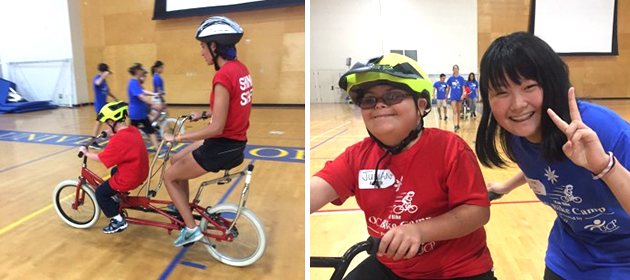
[ Contents ]
|
|||||
|
|||||
|
留学したらどんな生活? このコーナーでは、実際に留学中の学生からの生の声をお届けします!
<トビタテ!留学の奨学金をもらってボランティア活動>
私は幼い頃から習っているフィギュアスケートで、中学生時代に二度大きな怪我をし、フィギュアスケートを思い切り出来ず悔しい思いをしたこと、その休養中に養護学校でボランティアをさせて頂いたことからリハビリの大切さを知り、将来はパラリンピックを支える医療スタッフを志しています。 この夏、文部科学省が推奨しているトビタテ!留学JAPANの派遣生として、アメリカ カルフォルニア州 アーバイン市にある、障がいを持つ子ども達のリハビリをする専門施設UCP of Orange County で、2週間ボランティアさせて頂きました。 手配は全てIGEにお任せしました。IGEはアメリカに本社があり、日本に支社があるので、複雑な書類提出も全て日本語でサポートをしてくださいました。また、高校生の医療ボランティアの受け入れ先は珍しいので、実績のあるIGEでのサポートは本当に心強かったです。 1週目は午前中にAOI College of schoolで本場の英語レッスンを受講しました。午後はUCPで翌週のBike campに向けての準備をしました。実際に子どもたちと直接触れ合うことはできませんでしたが、面接のときに私の想いを真剣に聞き、持参した日本の伝承玩具に興味を持って頂けたことは本当に良い機会でした。 2週目は実際にBike campという障がいを持つ子どもたちが1人で自転車に乗れるようにサポートするプログラムに学生ボランティアとして参加させて頂きました。 
Bike Campは5日間の日程で1日に5セッションあり、1セッションに8名、計40名の子どもたちが参加しました。1人の子どもに2〜3人のボランティアが付き添い、指導は iCan Shineという団体が行います。この団体は他にもiCan DanceやiCan Swimというプログラムを障がいを持つ子どもたち向けに行なっています。iCan Bike(Bike camp) はカナダから始まり、今では全米で行われています。
1、2日目は、医師が考案した後輪がローラー状になっているRoller Bike(写真右)を使いバランスをとる練習とペダルを漕ぐ練習をしました。ローラーを次第に小さいものに変えていき、バランス力を鍛えました。子どもたちが緊張して下を向いてしまう傾向があるので、Bike以外の話をして気をそらしたり、身体接触による指示出しをして、限られた時間を有効に使えるよう気をつけました。 3日目以降はRoller Bikeにうまく乗れるようになったら、後ろにボランティアが乗る2人乗りのTandem Bikeで後輪が車輪になっているBikeで感覚を掴んでから、個人のペースに合わせて後輪が車輪になっている普通のTwo Wheel Bikeに切り替えていきます。この頃になると子どもたちの中に早く出来る子が現れ始め、心境の変化も見られました。このプログラムの目的は、Bikeに乗れるようになることで自信をつけることなので、ペースが遅くても絶対に他の子と比べないよう家族とボランティアは気を付けました。 
4日目からは外での練習も始まりました。外では、走り出す時の漕ぎ方やスピードの落とし方、ブレーキの掛け方など本格的な指導がされました。 5日目には全員が外練習をすることが出来、半数以上が補助なしでBikeに乗れるようになりました。子どもたちがBikeに乗れた時はまるで自分のことかのように嬉しかったし、感動しました。家族も涙を流して喜んでいました。 5日間という期間は短いと感じましたが、ボランティアにとっても子どもたちにとっても、『5日間でBikeに1人で乗れるようになる』という目標は実に明確だったので、結果的に全員がその目標を達成することが出来たのだと実感しています。この成功体験は、障がいをもつ子どもにとって貴重な経験だったと思います。出来ない事が出来る様になった時の喜びは、健常者も障がいを持っている子も同じだと強く感じました。そして国が違っても家族がわが子に注ぐ愛情も同じだと感じました。 
このプログラムを安全にかつ効果的に行うことが出来るのは多くの支援して下さる企業や団体、それを支えるボランティアの存在があるからだと実感しました。私自身も将来を考える時期にこの様な体験が出来た事を嬉しく思います。将来に繋がるよう、またこのボランティアに参加してみたいと思っています。本当にありがとうございました!! 最後に、Angelsの試合を見に行きました。大谷選手が、いきなり逆転3ランホームランを打ったのでびっくり! 
|
|||||
|
|||||
| このメールマガジンは、IGEニュースレターにご登録頂いた皆様、またIGE関係者の方にお送りしております。留学にご興味がなく、このニュースレターを希望されない場合は、IGEニュースレターの配信は、直ちに停止します。このメールマガジンを今後ご不要な方は、誠にお手数ですが、件名に「IGEニュースレター配信停止希望」とお書きになって、以下に本メールが送られてきたメールアドレスをご記入の上ご返送ください。メール転送サービス等をご利用の方は「IGEニュースレター」にご登録のメールアドレスをご記入ください。 お名前→ 停止希望のメールアドレス→ 返送先 news@weexchange.com このメルマガの著作権はIGEにあります。無断転載はお断り致します。 |







